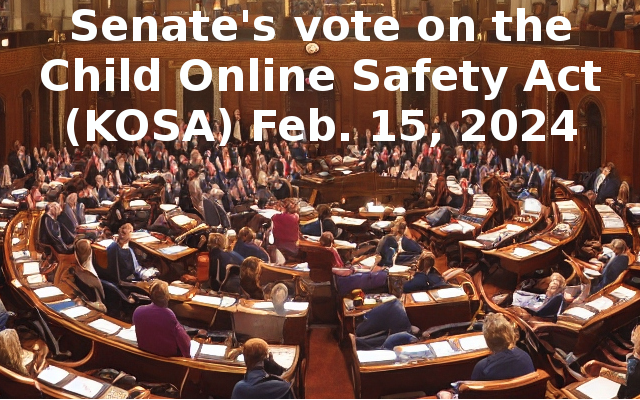Senate Passes Child Online Safety Act 61-60: Bipartisan Bill Aims to Protect Children Online

In a historic move, the Senate today voted 61-60 in favor of the Child Online Safety Act (KOSA), a bipartisan effort aimed at enhancing protections for children on digital platforms. The bill, spearheaded by Senators Richard Blumenthal (D-Conn.) and Marsha Blackburn (R-Tenn.), has garnered widespread support from both sides of the aisle, marking a significant step forward in Congress' attempt to regulate technology companies.
About the Child Online Safety Act (KOSA)
KOSA, first introduced in 2022, imposes comprehensive obligations on various digital platforms to safeguard children from a range of online harms, including:
- Bullying
- Harassment
- Sexual exploitation
- Anorexia
- Self-harm
- Predatory marketing
It mandates platforms to exercise reasonable care in preventing products that could endanger kids and to incorporate design features that mitigate risks of depression and other adverse effects.
Challenges and Amendments

Notably, the updated version of the bill addresses long-standing concerns from rights groups regarding potential misuse against LGBT youth and suppression of online speech. The inclusion of provisions to give regulators at the Federal Trade Commission a more central role in overseeing protections has garnered support from several LGBT rights groups, leading to the withdrawal of opposition.
Despite its bipartisan backing in the Senate, KOSA faces hurdles in the House of Representatives, where lawmakers have focused on comprehensive data privacy legislation. The disparity in priorities between the two chambers has resulted in regulatory voids, prompting state lawmakers to pursue their own privacy and child safety bills.
The momentum behind efforts to protect children online intensified following revelations from Facebook whistleblower Frances Haugen, who exposed how social media platforms exacerbated body image issues among teenage girls. This scrutiny has underscored the need for robust measures to hold tech companies accountable for the harmful effects of their platforms.
While the passage of KOSA represents a significant milestone, its journey to becoming law hinges on garnering support in the House. Child safety advocates remain optimistic that the overwhelming bipartisan backing in the Senate will exert pressure on House lawmakers to follow suit.
Protecting Minors Online: Legislative Summary
The legislative proposal delineated by the Congressional Research Service outlines a comprehensive framework aimed at shielding minors from the perils that abound in the digital realm. Under the purview of this bill, stringent requisites are established to safeguard the vulnerable demographic from online threats.
The ambit of these requisites extends to encompass platforms deemed as covered, denoting applications or services traversing the digital landscape that are predisposed to minors' utilization. Notably, exemptions carve out certain entities such as internet service providers, educational institutions, and electronic mail services from the stipulations enshrined within the bill's provisions.
Moreover, the onus falls upon covered platforms to furnish minors, or their lawful custodians, with a suite of protective measures. These entail the provision of mechanisms curtailing access to minors' personal information and endowing parents or guardians with oversight tools to monitor and regulate their wards' engagement with the platform, encompassing control over privacy settings and account configurations.
In addition to these primary mandates, covered platforms are mandated to divulge specified particulars, elucidating the intricacies surrounding the utilization of personalized recommendation algorithms and targeted advertising mechanisms. Concurrently, avenues are delineated for parents, guardians, minors, and educational institutions to report instances of harm encountered within the digital domain. Noteworthy prohibitions encompass the prohibition on the facilitation of advertising pertaining to age-restricted commodities or services, such as tobacco and gambling, targeting minors. Furthermore, an obligatory annual reporting mechanism is instituted, necessitating covered platforms to delineate foreseeable risks of harm engendered by minors' interaction with the platform.
Legislative Critiques and Revisions
Critics, among them the Electronic Frontier Foundation (EFF), raise concerns regarding the bill's definition of harm towards minors, suggesting it grants wide latitude for interpretation by state attorneys general tasked with its enforcement. This comparison draws parallels to the FOSTA-SESTA bills. The bill underwent revisions in February 2024, transferring the enforcement of "duty of care" provisions from state attorneys to the Federal Trade Commission, though states retain authority over other aspects of enforcement.
The Heritage Foundation, a conservative think tank, argued that the original 2022 version of the bill fell short, notably for its lack of explicit recognition of transgender health care as a harm. The inclusion of the phrase "consistent with evidence-informed medical information" raises concerns that anti-trans sources could be selectively cited as justification, given the absence of a clear definition for "evidence-based medical information". Senator Blackburn, a bill co-author, contends that certain educational content on racism and civil rights overlaps with what she terms "dangerous ideology" under critical race theory, potentially causing "mental and emotional damage" to children. She explicitly stated the bill's intention to censor transgender-related content.
In September 2023, a video surfaced showing Blackburn advocating for prioritizing the protection of minors from transgender influence, alongside her endorsement of the bill. This statement drew criticism from LGBT advocacy groups, fearing potential censorship of LGBT information. Blackburn's spokesperson clarified that the bill was not aimed at censoring LGBT content. In response to concerns, the bill was amended to narrow the focus of "duty of care" to platform design features influencing minors' behavior, excluding content. While some LGBTQ groups withdrew opposition, others, including GLAAD and GLSEN, remained critical. The EFF and Fight for the Future argued the revisions were insufficient, maintaining that LGBTQ content could still be targeted through design features facilitating its availability.
The Importance of The Child Online Safety Act (KOSA)
In a joint statement, Senators Blumenthal and Blackburn emphasized the imperative of addressing the concerns of young people and parents, underscoring the urgency for congressional action. As the debate over online safety continues, the passage of KOSA signals a pivotal moment in Congress' efforts to safeguard children in the digital age.
The passage of the Child Online Safety Act (KOSA) represents a crucial step in addressing the myriad risks children face in the digital realm. In an increasingly interconnected world, where children spend a significant amount of time online, ensuring their safety has never been more imperative. By mandating digital platforms to implement measures that shield children from bullying, harassment, exploitation, and other online harms, KOSA endeavors to create a safer online environment conducive to healthy development. Moreover, by setting higher standards for privacy settings and parental controls, the legislation empowers parents to actively oversee their children's online experiences. Ultimately, the enactment of KOSA not only underscores the government's commitment to safeguarding the well-being of our youth but also heralds a significant milestone in the ongoing effort to strike a balance between technological innovation and child safety.